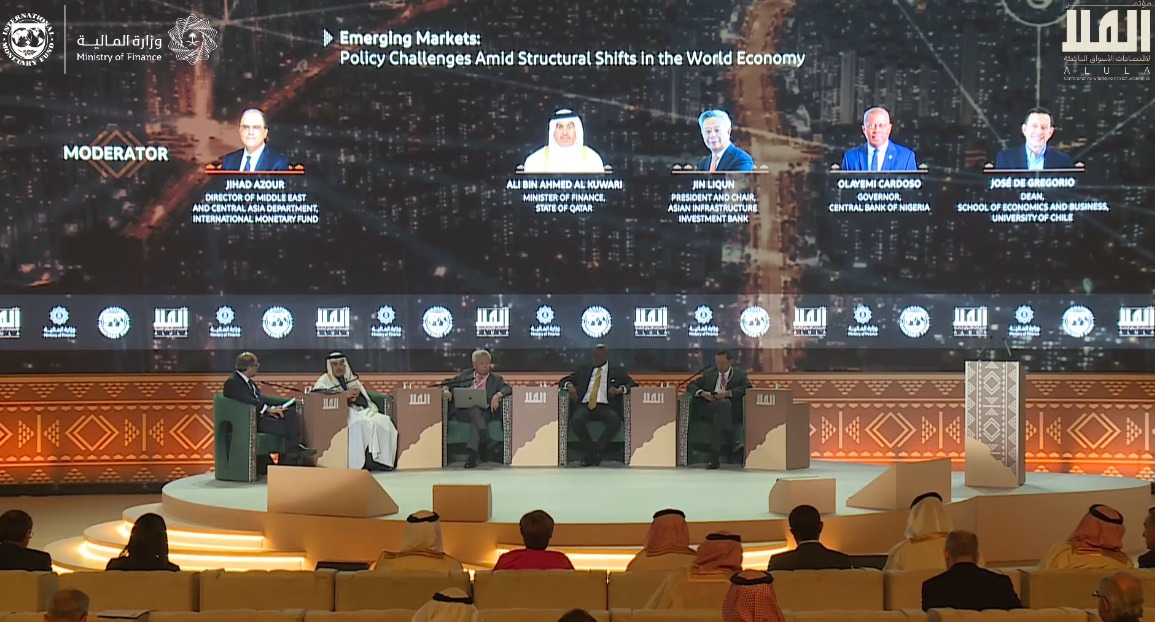RIYADH: Global growth is expected to stabilize at 2.6 percent in 2024, holding steady for the first time in three years, according to a new World Bank report.
The analysis warns that safeguarding trade, supporting green and digital transitions, delivering debt relief, as well as improving food security, are all needed to help deliver robust growth.
The report indicates that any stability will come despite geopolitical tensions and high interest rates, the latter being led by Washington – with the US Federal Reserve keeping the benchmark level at a 23-year high to combat inflation.
“The global economy is stabilizing, following several years of negative shocks. Global growth is projected to hold steady at 2.6 percent this year, despite flaring geopolitical tensions and high interest rates, before edging up to 2.7 percent in 2025-26 alongside modest expansions of trade and investment,” the report said.
“Global inflation is expected to moderate at a slower clip than previously assumed, averaging 3.5 percent this year,” the release added.
That said, central banks in advanced and developing economies and emerging markets are likely to remain cautious about easing policy.
Accordingly, the report indicates that the average benchmark policy interest rates over the next few years are expected to remain about double the 2000-19 average.
“Despite an improvement in near-term growth prospects, the outlook remains subdued by historical standards in advanced economies and EMDEs (Emerging Market and Developing Economies) alike,” the report explained.
This is owed to the fact that global growth over the forecast horizon is projected to be almost half a percentage point below its 2010-19 average pace.
The analysis continued to note that in 2024-25, growth is set to underperform its 2010s average in nearly 60 percent of economies, representing more than 80 percent of the global population and world output.
“Against this backdrop, decisive global and national policy efforts are needed to meet pressing challenges,” the report emphasized.
Furthermore, the analysis clarifies that high debt and elevated debt-servicing costs will require policymakers to seek ways to boost investment while ensuring fiscal sustainability.
Additionally, to meet development goals and bolster long-term growth, structural policies will also be needed to raise productivity maturation, enhance the efficiency of public investment, build human capital, and close gender gaps in the labor market.
In terms of regional prospects, growth is estimated to soften in most EMDE regions in 2024.
In East Asia and the Pacific, the expected slowdown this year mainly reflects moderating advancement in China.
Similarly, development in Europe, Central Asia, Latin America and the Caribbean as well as South Asia is also set to decelerate amid a slowdown in their largest economies.
In contrast, growth in the Middle East and North Africa region is projected to increase this year, although less robust than previously forecasted.
Zooming into the MENA region
The report sheds light on how activity by oil exporters and importers in the MENA region remained weakened from early to mid-2024.
Oil activity has been somewhat stagnant in member countries of the Gulf Cooperation Council, but the analysis explained how growth is anticipated to pick up to 2.8 percent in 2024 and 4.2 percent in 2025.
This is mainly attributed to a gradual increase in oil production and strengthened activity, which is anticipated to begin in the fourth quarter of 2024.
“The projection for 2024 is lower than what was expected in January, reflecting the extensions of oil production cuts and the ongoing conflict in the region,” the report stressed.
Meanwhile, growth in GCC countries is forecast to strengthen to 2.8 percent in 2024 and 4.7 percent in 2025.
In Saudi Arabia specifically, advancement in 2024 is projected to be supported by non-oil activity, and a gradual resumption of oil activity is expected to rise in 2025.
Among non-GCC oil exporters, a projected recovery in the oil sector in 2025 will help strengthen growth in both Algeria and Iraq.
Maturation among oil importers is expected to increase to 2.9 percent in 2024 and then rise to 4 percent annually in 2025-26.
In Egypt, growth is likely to surge, propelled by investment increases partly spurred by a large-scale deal with the UAE.
In Jordan, maturation is anticipated to remain steady, although tourism-related activities are expected to suffer in the short term.
Growth in Tunisia is forecast to rebound, but activity in Djibouti and Morocco is projected to soften in 2024.
Potential risks on the horizon
The report also underlines that a major downside risk is the possible escalation of regional armed conflicts.
A tightening of global financial conditions could lead to capital outflows and exchange rate depreciation for oil importers.
“Countries with high government debt would see increased debt-service burdens due to higher borrowing costs and the elevated risk of financial instability,” the analysis highlighted.
On top of this, severe weather events induced by climate change, as well as other types of natural disasters, remain a significant risk in the MENA region.
“Negative spillovers from weaker-than-expected growth in China would likely affect oil exporters through lower demand and prices for oil. However, stronger-than-expected growth in the US and the resulting improvement in global demand would benefit the region’s exports,” the analysis concluded.



























